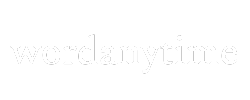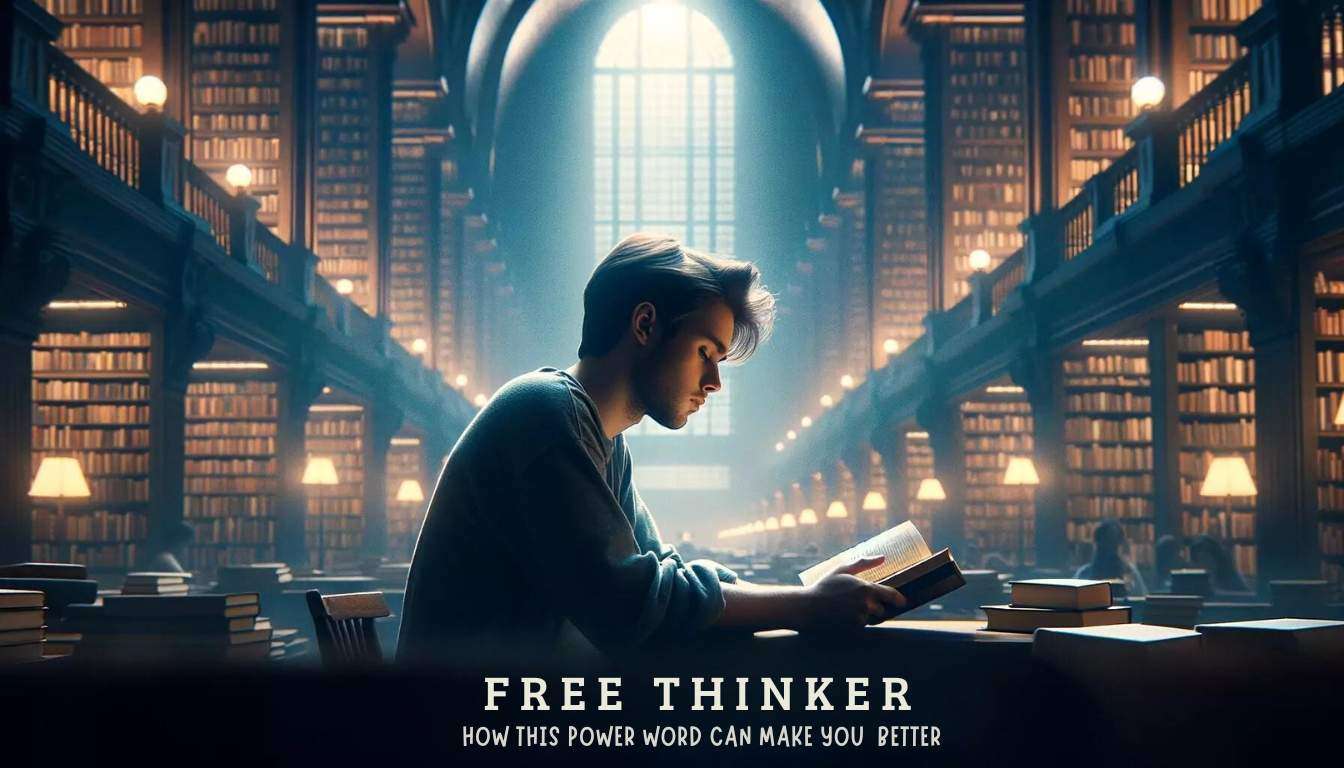Introduction
Have you ever been told to “think outside the box”? “Free Thinker: How This Power Word Can Make You Better” encapsulates the essence of thinking outside the box. While the phrase might seem common, embracing the role of a free thinker is precisely what it suggests.
Adopting a free-thinking mindset can be extremely difficult in a world where societal, cultural, and political norms are present. Yet, such a mindset is indispensable in contemporary society, especially if we aim to foster progress and growth.
But what exactly does it mean to be a free thinker? It involves more than just rejecting conventional ideas; it’s about cultivating an open and inquisitive mind. Free thinkers critically evaluate information, question standard norms, and explore alternative solutions without prejudice.
This approach not only sparks innovation but also promotes a deeper understanding of the world. In an era where change is constant and rapid, the ability to think freely and adapt is more crucial than ever. By being open to new ideas and willing to question existing ones, free thinkers can navigate the complexities of modern life and drive meaningful change.
Definition of Free Thinker
A free thinker is an individual who challenges conventional wisdom, questions authority, and established beliefs, and forms their own opinions based on critical thinking and rationality. Free thinkers can explore different ideas without bias or preconceived notions and are open-minded enough to consider all points of view before making informed decisions.
While many associate a free thinker with rebellion or contrarianism, this couldn’t be further from the truth. Instead, being a free thinker means having the courage to think for oneself without fear of judgment or ostracization.

The Importance of Being a Free Thinker in Today’s World
In today’s world, where information is available at our fingertips 24/7 through social media outlets and online news sources, it can be easy to fall into the trap of believing everything we see or hear without questioning its validity.
This can lead us down dangerous paths fueled by fear-mongering tactics used by those in power. Instead of blindly believing what other people tell us, being a free thinker enables us to take charge of our own lives and make informed decisions based on factual evidence.
By challenging assumptions and questioning authority, we can create positive change in our communities as well as globally. The importance of being a free thinker cannot be overstated; it allows us to break away from rigid beliefs that may not serve our best interests or may even cause harm in certain situations.
So if you’re ready to challenge your assumptions, explore new ideas, and become a more independent and critical thinker, then stick around. We’ve got a lot to learn about this power word: free thinker.
Benefits of Being a Free Thinker
Do you ever feel tired of blindly following and completely accepting everything that is presented to you? Now, it’s your turn to embrace independent thought. A free-thinking individual is someone who challenges established beliefs, thinks freely, and remains open to new ideas and perspectives.
But why should you become one? Here are some benefits of being a free thinker:
Ability to Think Critically and Independently
Free thinkers are good at thinking on their own and carefully. They don’t just believe what they are told. Instead, they think about the information and then decide what they believe. This helps them make decisions on their own, without being influenced by others.
Open-mindedness to New Ideas and Perspectives
Free thinkers possess open-mindedness. They are always willing to consider new ideas, even if they challenge their own beliefs or opinions. This trait makes them better problem solvers, as they can see situations from different angles and come up with creative solutions.
Increased Creativity and Innovation
Free thinkers’ open-mindedness also leads them towards increased creativity and innovation. They have the freedom to generate innovative ideas by breaking free from conventional thinking and societal norms.
Greater Self-awareness and Personal Growth
Being a free thinker leads to greater self-awareness and personal growth. When we question our assumptions or beliefs, we gain a better understanding of ourselves and improve our self-awareness.
By embracing new perspectives, we learn more about the world around us, which in turn helps us grow as individuals. Therefore, becoming a free thinker can change your life for the better, making you smarter, more creative, and innovative while also boosting your overall well-being!
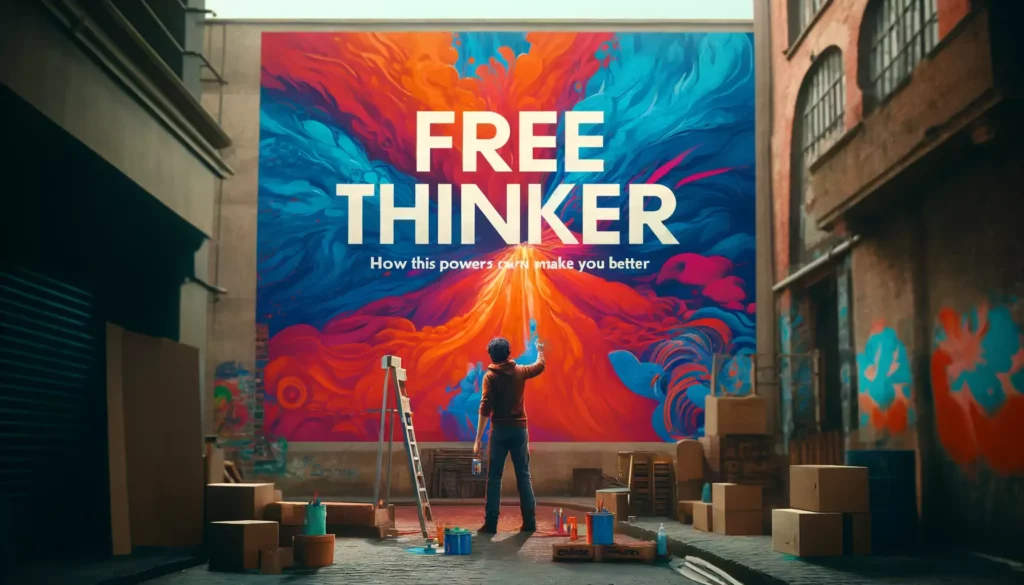
How to Become a Free Thinker
Questioning assumptions and beliefs is essential for becoming a free thinker. Often, we accept what we’ve been taught without critical examination. By challenging these preconceptions, you can break free from limiting beliefs and embrace new ideas. Start by identifying the assumptions that influence your thoughts on politics, relationships, or religion. Reflect on why you hold these beliefs and consider other viewpoints.
Philosopher Bertrand Russell emphasized this approach: “In all affairs, it’s a healthy thing now and then to hang a question mark on the things you have long taken for granted.” Challenging your beliefs can be uncomfortable, but the process is crucial for growth and opens doors to diverse perspectives and deeper understanding.
Seeking out diverse perspectives: Embracing diverse perspectives is crucial to free thinking. It’s easy to fall into an echo chamber where everyone shares similar views, but engaging with different viewpoints can enhance your understanding and sharpen your critical thinking skills. Make an effort to explore content that challenges your beliefs—read books or articles by authors who hold opposing views, watch interviews with thought leaders who disrupt their fields, or converse with people from varied backgrounds.
Nobel Laureate Daniel Kahneman highlights the importance of this approach: “A reliable way to make people believe in falsehoods is frequent repetition because familiarity is not easily distinguished from truth.” By exposing ourselves to a range of perspectives, we counteract this bias and enrich our cognitive landscape.
Mindfulness and reflection also play vital roles in cultivating free thought. Mindfulness practices, such as meditation, train us to observe our thoughts and emotions without judgment, enhancing our awareness. Regular reflection allows us to spot and modify limiting patterns in our thinking.
Lastly, embracing uncertainty is a fundamental aspect of free thinking. The world is complex and full of ambiguities, and learning to easily navigate this uncertainty is essential. Start with small risks, like trying a new hobby or initiating conversations with strangers.
Over time, these experiences build resilience and adaptability, preparing you for larger life challenges. As philosopher Bertrand Russell advised, “Do not fear to be eccentric in opinion, for every opinion now accepted was once eccentric.” This mindset encourages us to stay open and resilient in an ever-changing world.
The Historical Impact of Free Thinking
From Socrates to Steve Jobs: Icons of Free Thinking
Throughout history, countless free thinkers have dared to challenge the status quo and push the boundaries of what was thought possible. These individuals are often remembered as pioneers and visionaries ahead of their time.
Socrates, often hailed as the father of Western philosophy, famously advocated for critical questioning of the accepted norms, which laid the foundations for democratic ideals. His approach, “I know that I know nothing,” emphasizes the importance of questioning in the pursuit of knowledge.
Moving forward in time, Steve Jobs’ ability to envision radically innovative technologies reshaped entire industries.
His famous quote, “Innovation distinguishes between a leader and a follower,” captures the essence of his free-thinking approach to business and creativity.
Major Breakthroughs Achieved Through Free Thinking
Throughout history, free thinking has catalyzed major scientific and societal breakthroughs. Galileo Galilei and Isaac Newton were key figures in the scientific revolution, which had its roots in challenging preconceived notions about the nature of the universe. Galileo’s dedication to empirical evidence and questioning of Aristotelian cosmology paved the way for modern science.
In more recent times, the civil rights movement, under the leadership of thinkers like Martin Luther King Jr., relied on challenging deeply ingrained social norms. King’s profound statement, “Faith is taking the first step even when you don’t see the whole staircase,” exemplifies the courageous mindset of free thinkers who have changed the world.
These examples highlight how free-thinking not only advances knowledge and innovation but also drives societal progress. By challenging the status quo and thinking independently, these icons of free thinking have left indelible marks on history. Their legacies continue to inspire new generations to think freely and boldly pursue change.
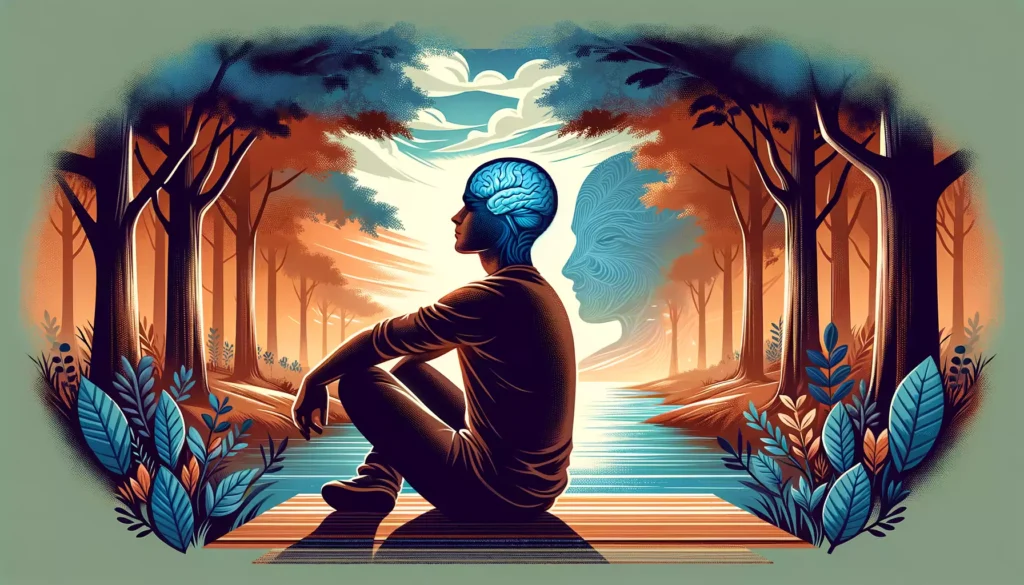
The Psychological Benefits of Being a Free Thinker
How Free Thinking Enhances Mental Health
Free thinking significantly contributes to mental health by promoting a sense of autonomy and self-efficacy. When individuals feel that they have the freedom to think independently and make their own decisions, they experience lower levels of stress and anxiety.
This empowerment is akin to what psychologist Carl Rogers described when he emphasized the importance of being true to oneself: “The curious paradox is that when I accept myself just as I am, then I can change.” Free thinkers often embrace this idea, accepting their thoughts and feelings without external judgment, which fosters a healthier psychological state.
The Link Between Free Thinking and Creativity
Creativity thrives in environments where free thinking is encouraged. By stepping outside conventional boundaries and exploring diverse perspectives, free thinkers can connect disparate ideas in novel ways. This process is essential for creative problem-solving and innovation.
Albert Einstein, a quintessential free thinker whose theories revolutionized our understanding of the universe, famously said,
“Imagination is more important than knowledge. For knowledge is limited, whereas imagination embraces the entire world, stimulating progress and giving birth to evolution.”
This quote underscores the vital role that free thinking plays in fostering creativity, suggesting that the freedom to explore and question is the cornerstone of innovative thought.
These aspects of free thinking not only enhance individual creativity but also contribute to overall mental well-being. By encouraging a mindset that values curiosity and open-mindedness, free-thinking supports psychological resilience and adaptability.
It allows individuals to better navigate the complexities of life with a creative and healthy approach, underscoring the profound interconnectedness between free-thinking, mental health, and creativity.
Challenges and Misconceptions
Debunking Myths About Free Thinking
One common misconception about free thinking is that it leads to rebellious or antisocial behavior. In reality, free-thinking encourages constructive questioning and informed decision-making. It fosters a more profound understanding and respect for differing viewpoints.
As philosopher Bertrand Russell noted,
“Do not fear to be eccentric in opinion, for every opinion now accepted was once eccentric.”
This quote highlights the essential role of free thinkers in challenging the status quo and advancing society. By debunking the myth that free thinking is merely contrarian, we recognize it as a vital component of intellectual and societal progress.
Navigating the Social Implications of Being a Free Thinker
Being a free thinker can sometimes lead to social isolation or conflict, as challenging widely accepted norms may not always be well-received. It requires courage and resilience to maintain one’s convictions in the face of opposition.
Susan B. Anthony, an advocate for women’s rights, exemplified this when she said, “Cautious, careful people, always casting about to preserve their reputations… can never effect a reform.” Her life demonstrated that being a free thinker often involves navigating complex social dynamics and sometimes facing criticism or resistance.
However, the ability to influence meaningful change and contribute to societal evolution underscores the importance and impact of maintaining free thought in social contexts.
By understanding these challenges and misconceptions, free thinkers can be better prepared to engage with the world around them in meaningful and effective ways. They can also help foster a culture that values and encourages free thought, contributing to a more open, innovative, and inclusive society.

Practical Steps to Cultivate Free Thinking
Techniques to Enhance Your Critical Thinking Skills
To enhance critical thinking skills, it’s crucial to develop the ability to question assumptions and evaluate information objectively. Engaging in debates and discussions can provide a robust platform for challenging and refining your viewpoints.
Renowned thinker Edward de Bono emphasized the importance of deliberate thinking methods in his quote, “Critical thinking, without hope or agenda. Less certainty, more inquiry.” Adopting strategies such as the ‘Six Thinking Hats’ method he developed can help individuals explore different perspectives systematically, thus improving their critical analysis skills.
Daily Habits to Support Independent Thinking
Cultivating daily habits that support independent thinking begins with dedicating time for solitude and reflection. Setting aside moments to ponder personal beliefs and decisions without external influences is vital.
Author Virginia Woolf highlighted the power of reflective thinking in her assertion, “No need to hurry. No need to sparkle. No need to be anybody but oneself.” Regularly engaging in activities that foster concentration and mindfulness, such as journaling or meditation, can reinforce mental clarity and decision-making autonomy.
By integrating these practices into daily life, individuals can significantly enhance their free-thinking capabilities, leading to more reasoned, balanced, and independent thought processes.

Free Thinking in the Digital Age
The Role of Technology in Promoting or Hindering Free Thought
In today’s digital age, technology plays a dual role in shaping free thought. It offers unprecedented access to information and diverse perspectives, yet it can also confine us to echo chambers that reinforce existing biases.
The philosopher Marshall McLuhan once said, “The medium is the message.” This insight is crucial to understanding how digital platforms shape our perceptions and thinking patterns. By selectively presenting information, these platforms can either expand our horizons or narrow them.
Free thinkers need to navigate this landscape by actively seeking out varied sources and engaging with differing viewpoints to maintain a balanced perspective.
Protecting Intellectual Freedom Against Digital Echo Chambers
To protect intellectual freedom in the digital realm, individuals must be vigilant against the formation of echo chambers. These digital bubbles, where one’s views are continuously echoed back, can stifle free thought and reinforce misinformation.
Tim Berners-Lee, the inventor of the World Wide Web, emphasized the importance of using the Internet as a tool for empowerment rather than restriction, stating, “We need diversity of thought in the world to face the new challenges.” Techniques such as varying one’s digital consumption, engaging in critical thinking, and verifying sources can help maintain the integrity of one’s thoughts and prevent the homogenization of ideas.

Free Thinking and Leadership
How Leaders Can Foster a Culture of Free Thinking
Leaders play a pivotal role in shaping a culture that embraces free thinking. By creating an environment where questioning norms and innovative ideas are encouraged, leaders can drive their organizations toward greater creativity and problem-solving capabilities.
John F. Kennedy encapsulated this idea when he said, “Leadership and learning are indispensable to each other.” Leaders who promote continuous learning and curiosity naturally foster a free-thinking atmosphere. Implementing open forums, encouraging constructive feedback, and rewarding innovative ideas are practical ways leaders can cultivate this culture.
Case Studies of Effective Free Thinking in Corporate Settings
Several leading companies have successfully embedded free thinking into their corporate cultures. Google, for instance, is renowned for its ‘20% time’ policy, which allows employees to spend 20% of their time on projects they are passionate about, independent of their regular responsibilities.
This policy has led to the development of significant innovations, such as Gmail and AdSense. Another example is Pixar, which holds regular “brain trust” meetings where creators present their work in progress for open critique.
Ed Catmull, co-founder of Pixar, emphasizes, “The candid sharing of thoughts and ideas helps keep our feet planted solidly on the ground, ensuring that our portrayals and stories reflect real emotions and real problems.” These case studies demonstrate how empowering employees to think freely can lead to substantial business achievements and innovations.
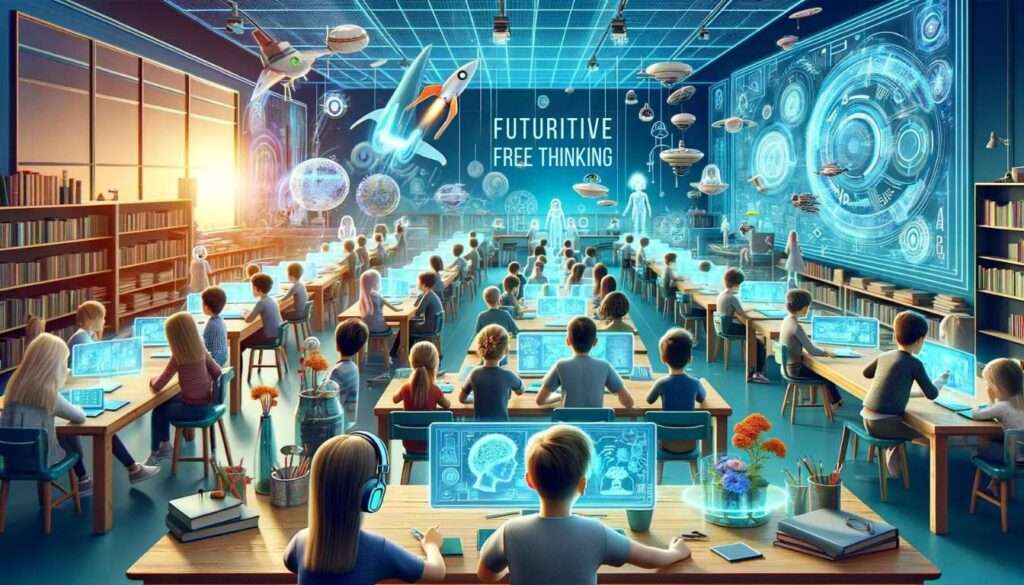
The Future of Free Thinking
Predictions and Trends for the Next Decade
As we move into the next decade, the landscape of free thinking is expected to evolve significantly due to technological advancements and global interconnectivity. Experts predict an increase in cross-disciplinary and multicultural exchanges that will further enhance creative problem-solving and innovation.
Futurist Ray Kurzweil suggests that we are on the brink of a future dominated by an even greater ability to network, share, and collaborate. He emphasizes how interconnectedness will amplify our capacity for free thinking.
The integration of advanced technologies, such as AI and machine learning, will also play a crucial role in expanding the boundaries of what we can explore intellectually.
The Role of Education in Cultivating Future-Free Thinkers
Education will continue to be pivotal in cultivating free thinkers by adapting curricula to include more critical thinking, problem-solving, and innovation-focused programs. Schools and universities will likely incorporate emerging technologies to foster an environment where students can experiment and explore ideas freely.
Sir Ken Robinson, a well-known advocate for educational reform, endorsed this strategy by saying that “creativity is as important in education as literacy, and we should treat it with the same status.” By prioritizing creativity alongside traditional educational metrics, institutions can prepare students not only to succeed in their careers but also to be instrumental in driving societal progress.
Conclusion: Why We Need More Free Thinkers in the World Today
Free thinking is an important way of thinking that everyone should try to develop. In a world full of constant information and easily influenced opinions, it’s important to think critically and independently.
By thinking freely, we not only help ourselves but also society. One major benefit of free thinking is that it allows us to challenge what is normal. Progress happens when people question what they know and look for new ideas. Right now, the world is facing big issues like inequality, climate change, and political problems.
By using free thinking, we can come up with new solutions and make positive changes for ourselves and future generations. Another reason we need more empowered free thinkers is that it helps us understand and care about others’ problems. When we consider new perspectives and ways of thinking, we start to accept and appreciate others’ beliefs and experiences. This can lead to more kindness toward those who are different from us or face challenges we don’t understand.
In turn, this can help bring different groups of people together and make the world more peaceful. Being a free thinker isn’t always easy, but it’s worth the effort. By questioning what we assume, looking for different views, staying present, accepting uncertainty, and challenging what’s normal, you can make a big difference in your life and the world. So, keep an open mind and remember: the best ideas often come from those who dare to think differently!
FAQs for “Free Thinker: How This Power Word Can Make You Better”
What is a free thinker?
A free thinker is someone who forms opinions based on reason, independent of authority or tradition.
Why is free thinking important?
Free thinking encourages critical and innovative thinking, essential for problem-solving and progress in today’s complex world.
How can I become a free thinker?
Cultivate curiosity, challenge existing beliefs, seek diverse perspectives, and engage in continuous learning.
What are the benefits of being a free thinker?
Enhanced creativity, better problem-solving skills, greater independence, and improved decision-making abilities.
How does free thinking impact creativity?
It breaks down conventional boundaries, fostering innovative ideas and solutions.
Can free thinking improve my relationships?
Yes, it can lead to more open and honest communications, fostering deeper understanding and respect.
What challenges might I face as a free thinker?
Possible isolation or conflict with conventional thinkers and resistance to change in traditional settings.
How does free thinking influence leadership?
It promotes adaptive, visionary leadership styles that are responsive to change and open to new ideas.
What role does skepticism play in free thinking?
Healthy skepticism helps verify facts, challenge assumptions, and protect against manipulation.
How can free thinking benefit society?
It encourages a culture of questioning and critical examination, vital for democratic societies and scientific advancement.

